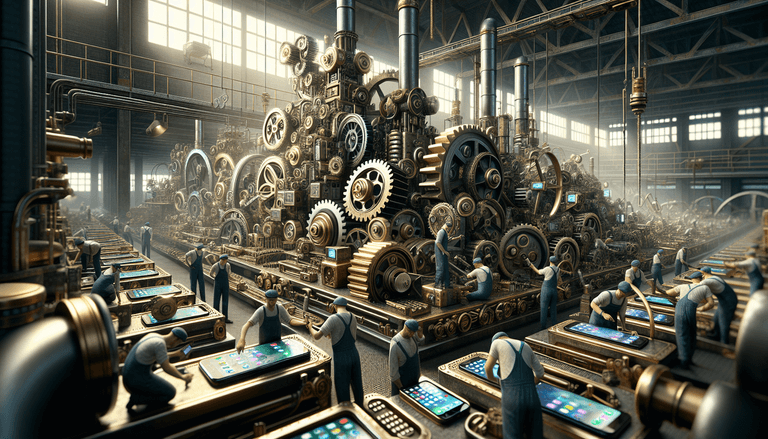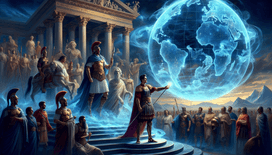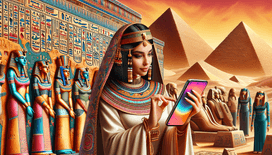Greetings, fellow voyagers of time and technology! Today, we're embarking on a delightful detour through the mists of time, laden with gigabytes of "what ifs" and "why nots." Picture this: the Industrial Revolution, that seismic shift of soot, steam, and social change, stirred not by the chugging rhythm of steam engines but with the pixelated pulse of smartphones.
The Smoke Signals of Social Media
Now, let's set the scene. Imagine the bustling factories of Manchester, layered with a haze not just from chimneys, but from a thousand selfies. Workers on the factory floor, staring not into the bellies of steam boilers but into the comforting glow of handheld gadgets, posting hourly updates of press-machine predicates to a burgeoning working-class following on "FaceScroll", the social network of the age.
"Just had the best lunch break ever 😜! #SteamChicIfYouKnowWhatIMean," tweets a weaver called Edith, instantly receiving likes from Lancashire to Vienna. Her loom looms in the background, the fabric of tweets just as tangible as the sacks of cotton it churns out.
The Labour Movement gets into Labour
Revolutionary fervour, before relegated to hushed meetings in darkened taverns, now has a megaphone in memes and hashtags. The Luddites, with their infamous distrust of machinery, could find solace and solidarity in a subreddit, called "TechTears," while spinning tales of their latest cotton-gin-decimation-depictions for their post-Industrial followers.
And how about trade unionists double-tapping their way to a general strike? Imagine Charlotte Perkins Gilman not penning essays but ruling the Twitterverse with a trending hashtag of #EqualityEmpowered or #TiredOfSpindleDrama. A virtual picket line would spring forth before a single protester could ever don a coal-blackened cap.
The "App-renticeships" of a New Era
"Cogs and QWERTY" (patent pending) replaces traditional apprenticeships, as young minds are plucked from village life not just for their nimble fingers but for their capacity to decipher binary from bash. Lessons on steam modulation are swapped for coding classes, and the icon of a wrench is swiftly outstripped by the silhouette of a charging cable.
The textile mills become a breeding ground for the new IT crowd, only their "spinning jennys" now churn out lines of code rather than skeins of yarn. Think of it, a Snapchat tutorial on "Sprocket Socketing" goes viral, and an "App Store" of widgets and whenever-evertries (software musings of a semi-pointless nature) redefine the sharing economy.
The Wheels of Progress...in Your Pocket
Meanwhile, new architectural designs inspired by Google Maps pioneer efficiency in transportation, as factory towns spring to life around branching railways that more careful planning, curated by apps like "TappedRoutz", smartly dwindles travel times like steam off a railcar.
With directions and designs a swipe away, Isambard Kingdom Brunel might pause mid-rivet to wonder at the newfangled understanding of a digital world rapidly sneaking into his calculus through a backdoor of ones and zeroes.
Let the Chips Fall Where They May
Could "apps" lay down the axles of destiny? We've constructed our past on the edifice of "what if," and I'm thrilled to ask, dear reader, "why the Dickens not?" Perhaps we've cracked the puzzle of history's greatest cold case: the Industrial Revolutions' nexus with modern tech.
This playful muse is only a shout through a cavern, but I submit it to you, history and technology buffs, with a grin and a giggle: What if the clattering wheels of history really did exchange steam for selfies?
Until next time, adventurers, keep your hand in the (time) pocket of curiosity, and your phone at the ready... just in case.







